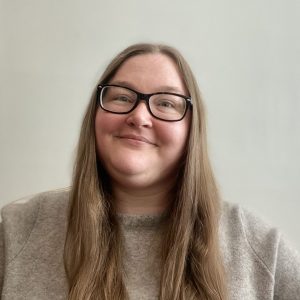Meet Liz Stuewe, the ERC’s New Accessibility Rights Manager
By Nick Adjami and Liz Stuewe
July 1, 2022
Liz joined the Equal Rights Center in April and we are thrilled to have her on board! Her disability rights expertise and passion for her community make her a vital addition to our team. We’re excited to introduce her to you through this conversation she had last week with Senior Communications & Engagement Coordinator Nick Adjami.
Note from Liz: I prefer to use identity-first language for myself: i.e. “I am disabled.” Other folks prefer using person-first language: i.e. “I am a person with a disability.” I respect the language a person chooses for themself, so you’ll see me using both identity-first and person-first language depending on the setting and topic.
 NA: It’s great to see you Liz! I hope you’ve settled in well these past couple months and I’m excited to chat today. First off, can you tell us a bit about yourself and your career up to this point?
NA: It’s great to see you Liz! I hope you’ve settled in well these past couple months and I’m excited to chat today. First off, can you tell us a bit about yourself and your career up to this point?
LS: My entire career has been in the non-profit or public service field. I often joke that I’ve only worked at one “for-profit” company, and I have to use the quotes because it was a coffee shop that went out of business. For many years, I provided services to survivors of domestic violence, often working at the intersection of domestic violence and health/disability. By working both directly with survivors with disabilities and on the health needs of survivors at a systemic level, I was able to see and start to address many of the additional challenges people with disabilities face when seeking safety. Additionally, I was very lucky to work with a wonderful group of people at an independent living center. I carry their deep respect for the independence and dignity of disabled people wherever I go and in whatever I do.
And in your role at the ERC what will you be focusing on? I hear you might be looking to collaborate with some of our members.
My role as the Accessibility Rights Manager is to protect and advocate for the civil rights of people with disabilities. This involves many different types of work, including making sure that the ERC is proactively engaging with and seeking to address the needs of our community. One thing I am currently working on is the Accessibility Rights Group which will help inform strategies to address accessibility issues. If you’re interested in joining the group, I’d love to talk with you more about it! Just email me at LStuewe@equalrightscenter.org.
What got you interested in working in the disability rights space?
I became disabled when I was 13 and struggled to feel comfortable with the identity until I was introduced to the idea of disability justice and to the diverse community of people with disabilities. Now I see my disabilities as my greatest strength. They have made me more creative and intentional. They have taught me advocacy and listening skills. I want to use these strengths in service to my community.
As you know we are about to celebrate the 32nd anniversary of the Americans with Disabilities Act becoming law. I hear you have an interesting connection to Senator Bob Dole, who helped get the Act through Congress. Can you talk about that and, more broadly, what the law means to you?
I was born and raised in Kansas, which Senator Dole represented, and I remember hearing a lot about the ADA when I was younger because of his connection to it. It took on a whole new meaning for me once I became disabled and had to become more familiar with my rights in educational settings. I went on to attend the same undergraduate institution and law school as Senator Dole (University of Kansas and Washburn University), so I was lucky to be able to learn about the law in many different settings.
I love learning about the disabled activists who made the passage of the law possible. They have deeply informed my own relationship with my disability and my advocacy. I want my work to bring the world closer to achieving the vision they laid out – where all people with disabilities have what they need to thrive. The passage of the ADA advanced that mission, but there’s still important work to be done.
Absolutely. We’re lucky to have you on our team leading that work. For a fun question – I hear you’re quite a reader! Any recommendations?
I have a family filled with bookworms and we have over 1,400 books in our house! I love reading all kinds of books- novels, non-fiction, comics and more. Some of my favorite books by folks in the disability community are “Crip Kinship: The Disability Justice & Art Activism of Sins Invalid” by Shayda Kafai and “Disability Visibility: First-Person Stories from the Twenty-First Century” edited by Alice Wong.
———
The ERC is a civil rights organization that identifies and seeks to eliminate unlawful and unfair discrimination in housing, employment and public accommodations in its home community of Greater Washington DC and nationwide. The ERC’s core strategy for identifying unlawful and unfair discrimination is civil rights testing. When the ERC identifies discrimination, it seeks to eliminate it through the use of testing data to educate the public and business community, support policy advocacy, conduct compliance testing and training, and, if necessary, take enforcement action. For more information, please visit www.equalrightscenter.org.

